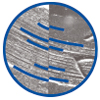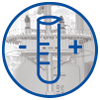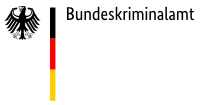The core competencies of the Forensic Science Institute (KTI), such as forensic casework, research and development, maintaining collections and expert systems, as well as education and consultancy, are always aimed at increasing the validity of the evidence.
In order to be able to process the assignments of the prosecution authorities competently and with state-of-the-art science and technology, the Forensic Science Institute of the German Federal Criminal Police Office not only possesses the technical and scientific equipment necessary to achieve this, but also meets its statutory obligations with a high level of technical specialisation.
Casework

In the 22 specialist areas of the Forensic Science Institute, which investigate the most diverse of court exhibits, such as for instance firearm and ammunition parts, forged documents, material of biological origin, audiovisual recordings, or substances such as narcotics and materials deployed in arson or explosives, approximately 10,000 assignments are processed every year. Our clients are the German Federal State Authorities, courts, district public prosecution authorities, the Federal Police, or departments within the BKA. In the context of international legal assistance, assignments from abroad are increasingly being processed. Expert opinions arising from casework are also given in court.
Research and development

In times of rapid scientific and technical development, as well as increasing internationalisation, it is essential that forensic work methods are adapted to constantly changing conditions. It must not only be ensured that science is kept up to date, the Forensic Science Institute must also face a changing crime situation. For their part, the expectations of the police and judiciary are always focussed on developing the possibilities of physical evidence further. For forensic science this means: innovation, plus constant optimisation of existing techniques and procedures.
Forensic research and development at the KTI derives a special character from the statutory mandate and the identity of the BKA as a central agency, in particular however, from the goal of constantly developing our role as initiators and leaders at national and international levels.
Collections and expert systems

Most of the successful investigations based on physical evidence are without doubt attributable to the forensic collections and expert systems maintained by the Forensic Science Institute. Not only do instruments of crime such as weapons or ammunition find their way into our collections, but also the most diverse of reference specimens which may in some way be relevant to solving a criminal offence, whether it be automotive paints, narcotics, explosives or footprints.
Maintaining these collections presupposes complex market searches and industrial contacts, as well as an active participation in national and international congresses. The information contained in our collections is of great importance, not only for the work of the KTI, but also for the forensic services of the federal states, as well as forensic science institutes worldwide.
Education and consultancy

The dissemination of forensic knowledge is an integral component of the tasks performed by the KTI. Thus the Forensic Science Institute is significantly involved in the fundamental mandate of the BKA to provide basic and advanced training for the German police. In the context of the advanced training seminars of the BKA, not only official experts from the criminal police agencies of the German federal states are trained, senior police personnel, judges, public prosecutors and defence counsels are also informed about the status and possibilities of forensic science. The KTI advises Criminal Investigation Department committees and ministries at state and federal level with regard to scientific standards, which may be relevant, for example, to aspects of legislation or planned prevention measures. Also the further training of experts abroad is an established tradition, mainly in the context of police training and material assistance, which are agreed upon at political level.
